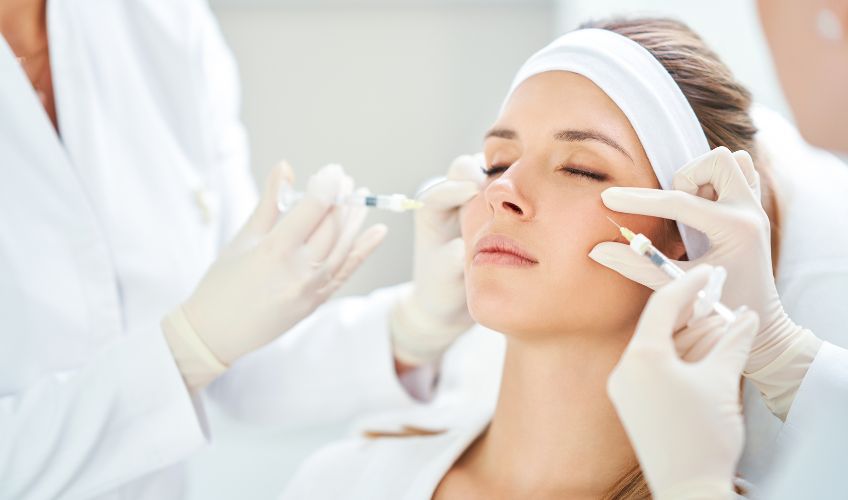Thinking about getting Botox but unsure about the aftercare process?
Botox has gained popularity as a cosmetic treatment to enhance aging skin. This procedure uses a sterile, lyophilized form of botulinum toxin type A to diminish fine lines, wrinkles, and sagging skin (1). Consequently, the skin appears more youthful and radiant.
Previously, Botox was primarily associated with celebrities, but now many women opt for it as they age. This trend has led to a rise in inquiries about post-treatment care.
This article tackles a frequently asked question: can you wash your face after receiving Botox?
Your Face After Botox

Botox injections are given at specific locations. The active substance in Botox blocks certain nerve signals that cause muscle contractions (2). Therefore, the treated muscles remain tense and tight instead of contracting.
Immediately following the injection, small pink dots might appear at the injection sites, but they typically fade within minutes and are not obvious. There are generally no signs of tenderness or swelling from a Botox injection.
It’s essential to note that results are typically noticeable after a few days, with the full effect visible in around two weeks.
Can I Wash My Face After Botox?
Yes, you can wash your face after getting Botox. It’s actually recommended to keep the treated area clean to avoid infection. You can also resume your normal activities the same day.
However, consider the following tips when washing your face post-Botox:
- Use lukewarm water
- Gently cleanse the face
- Avoid rubbing the face with a towel
- Pat the face dry
Additionally, if you follow a skincare routine, you can restart it a few hours after the Botox treatment. Experts also suggest waiting about 3 to 4 hours before applying makeup.
Because Botox involves minor punctures in the skin, applying makeup immediately could lead to contamination.
Waiting a few hours will give these punctures time to heal correctly.
As previously discussed, it's important to exercise some caution when washing your face following a Botox treatment. Experts recommend using cleansers containing alpha hydroxy acid (AHA) or beta hydroxy acid (BHA) post-Botox.
How to Wash Your Face After Botox?

These ingredients act as exfoliants (3), helping to gently remove dead skin cells. They are effective in addressing several surface-level skin issues.
Moreover, refrain from scrubbing your skin, particularly at the injection sites. Also, avoid undergoing additional treatments such as chemical peels or microdermabrasion for several days after receiving Botox.
Is There Any Risk in Washing Your Face After Botox?
Ignoring aftercare guidelines can increase the likelihood of complications. For example, aggressive face scrubbing may lead to negative side effects.
Since Botox is administered in a liquid form into the muscles, rough handling can cause it to spread from the targeted area to other muscles. To prevent this, you should adhere to the following aftercare instructions for a few hours:
- Refrain from scrubbing your face immediately
- Avoid lying down for 1-2 hours
- Do not engage in strenuous physical exercise right away
Fortunately, Botox won't migrate to other muscles after a few hours. After this period, you can resume normal activities. Your practitioner will provide specific guidelines on how long to follow these aftercare instructions to achieve the best results.
As long as you handle post-Botox activities gently, there should be no risks.
Conclusion
Although there are many aftercare recommendations following a Botox treatment, taking care when washing your face is among the most crucial. Aggressive scrubbing at the injection site or participating in activities that affect blood flow can interfere with the desired results.
If you're wondering whether you can wash your face after Botox, the answer is yes, but with caution. Keeping the treated area clean is essential to avoid infections or irritation.
Related Articles
Azelaic vs Salicylic Acid: Which One Should You Choose?
Toner Vs. Serum: What’s The Difference?